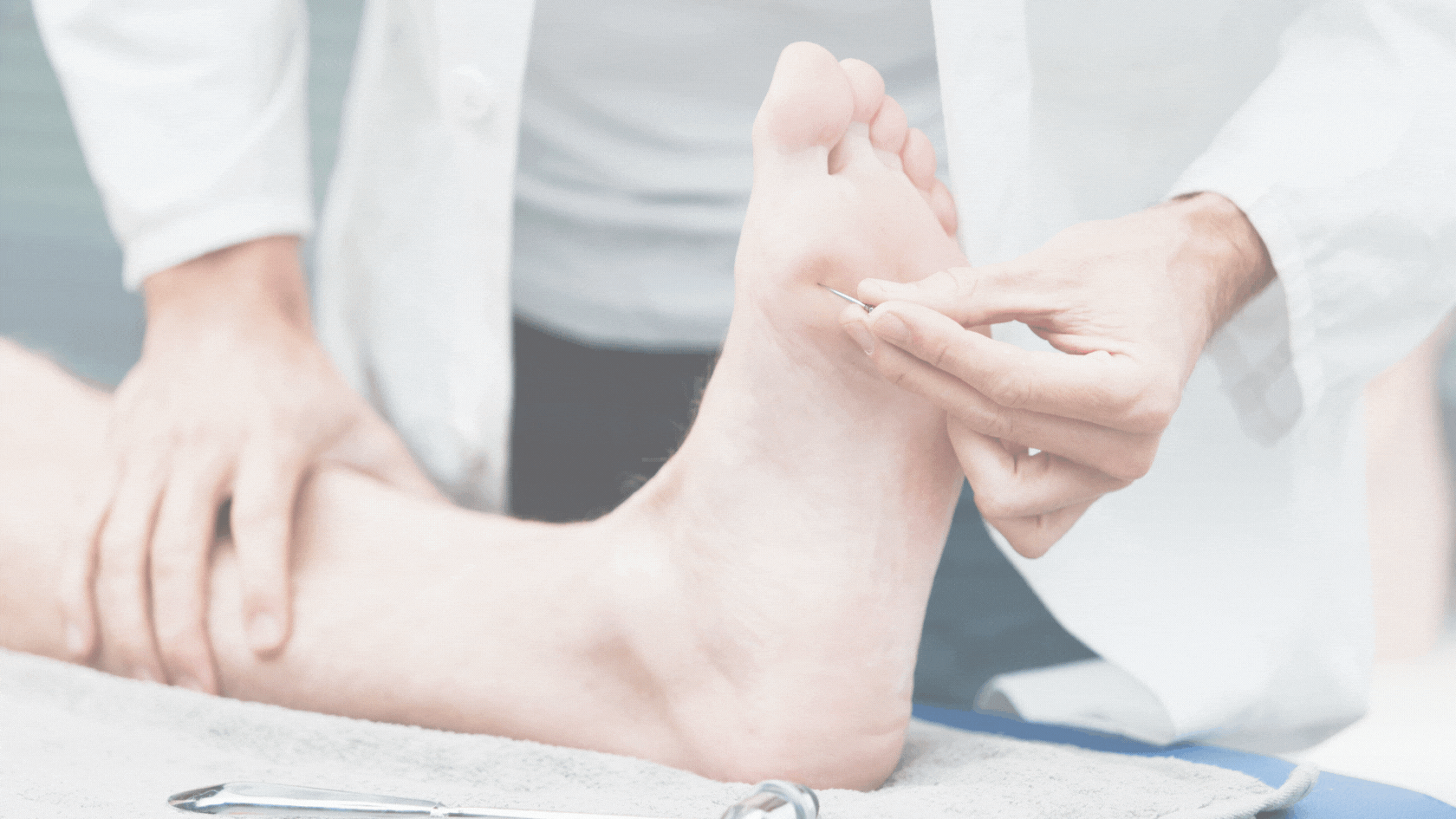Diabetic Foot Doctor Near Copiague NY

Welcome to Cherrywood Foot Care where your foot health is our top priority. Our expert team, led by an experienced diabetic foot doctor near Copiague NY, is dedicated to providing comprehensive care tailored to the unique needs of diabetic patients. From advanced wound care to preventative strategies, we offer a wide range of services designed to enhance your mobility and overall well-being. Trust us to help you manage your foot health effectively, so you can walk confidently and comfortably through life.
DIABETES AND FOOT HEALTH
 Diabetes is known to cause vascular and nerve damage, leaving diabetics more susceptible to foot problems. Of the many problems diabetics may face, peripheral neuropathy and peripheral vascular disease are two major conditions that cause diabetics to have problems with their feet. Take note of all the following conditions, causes, and symptoms of diabetic foot problems in order to give yourself the best chance to get the help you need. If you’re in need of help, our diabetic foot doctor near Copiague NY at Cherrywood Foot Care can help you!
Diabetes is known to cause vascular and nerve damage, leaving diabetics more susceptible to foot problems. Of the many problems diabetics may face, peripheral neuropathy and peripheral vascular disease are two major conditions that cause diabetics to have problems with their feet. Take note of all the following conditions, causes, and symptoms of diabetic foot problems in order to give yourself the best chance to get the help you need. If you’re in need of help, our diabetic foot doctor near Copiague NY at Cherrywood Foot Care can help you!
PERIPHERAL VASCULAR DISEASE
Peripheral vascular disease is known as an illness inside the blood vessels that resides near the heart and brain. This condition yields foot problems because it blocks off the supply of blood that is high in oxygen, to reach vital organs, feet, legs, and other parts of the body. The symptoms of this disease are far more than simple foot cramps. The symptoms for this disease include:
- Cold feet
- Lack of laceration healing on the feet and legs
- Painful toe ulcers
- Feet color fluctuated from pale to deep red
- Thickening toenails
- Loss of hair on the foot surface
- Foot numbness
PERIPHERAL NEUROPATHY
Peripheral Neuropathy, often referred to as having “glove and stocking” symptoms, is a condition that attacks the nerves of the spinal cord and brain. Symptoms of this condition are directly linked to hand and feet problems which is where the saying “glove and stocking” symptoms originated. If you have diabetes and are feeling any of the following symptoms, contact your diabetic foot doctor near Copiague NY at Cherrywood Foot Care:
- Itching of the feet and hands
- Burning of the feet and hands
- The intense pain of the feet and hands
- Numbness of the feet and hands
- Tingling sensation located in the feet and hands
Of the feet, the toes will usually feel the most severe end of these symptoms. Be on the lookout for these to approach the problem quickly!
OTHER COMMON DIABETIC FOOT PROBLEMS
Diabetes brings on a multitude of problems with the feet. More than 15% of people with diabetes also endure foot agony. The long list of problems, that can be treated and prevented with a diabetic foot doctor near Copiague NY, are as follows:
- Foot distortions: Ingrown toenails, bunions, spurs in the heel, and “hammertoes”
- Toe problems: Fungus of the toenail and burning sensation causing difficulty in sleeping
- Skin problems: Dry skin, skin cracks, skin cuts, irritation/itching of the skin, and foot ulcers.
Again, these problems are chronic and cause diabetics a great deal of pain so becoming aware of these conditions is a step in the right direction. Be sure to check your feet daily and be self-conscious of the feelings in your feet and toes. Also, be sure your shoes are the perfect fit so you do not have to worry about your shoes causing you extra pain. Taking small steps to eliminate the chances of experiencing foot pain are extremely important if you are looking to end your discomfort.
CHERRYWOOD FOOT CARE – DIABETIC FOOT DOCTOR NEAR COPIAGUE NY
Our diabetic foot doctor near Copiague NY will give you the best chance to manage and recover from your foot problems caused by diabetes. Our team of trained professionals will not only put their knowledge to work but they will also utilize industry-leading technology to ensure your condition is handled professionally. We specialize in diabetic foot problems and realize it is a big problem for people, that is why we draw up a custom plan to execute each problem. To trust us in getting you back on your feet with confidence, just call (516) 826-9000. We can’t wait to get started with you!
Daily Foot Care Routine for Diabetics
Living with diabetes requires meticulous attention to various aspects of health, particularly foot care. Diabetes can lead to complications that affect the feet, making a dedicated foot care routine essential. Our diabetic foot doctor near Copiague NY outlines a detailed daily foot care regimen tailored specifically for people with diabetes to help prevent complications and maintain optimal foot health.
Understanding the Importance of Foot Care in Diabetes
Diabetes can cause nerve damage (neuropathy) and poor blood circulation, both of which can lead to serious foot problems. Neuropathy reduces sensation in the feet, making it difficult to feel pain, heat, or cold, which can lead to unnoticed injuries. Poor circulation slows down the healing process and increases the risk of infections. Therefore, a consistent and thorough foot care routine is crucial for people with diabetes.
 Daily Foot Care Routine
Daily Foot Care Routine
1. Inspect Your Feet Daily
Daily inspection is the cornerstone of diabetic foot care. Use a mirror to examine all areas of your feet, or ask for assistance if needed. Look for cuts, blisters, red spots, swelling, and nail problems. Any abnormalities should be reported to your healthcare provider immediately.
2. Wash Your Feet Properly
Cleanliness is vital. Wash your feet daily with warm (not hot) water and mild soap. Avoid soaking your feet, as prolonged exposure to water can cause the skin to become dry and cracked. Thoroughly dry your feet, especially between the toes, to prevent fungal infections.
3. Moisturize Your Feet
After washing, apply a moisturizer to your feet to prevent dryness. Avoid applying lotion between the toes, as excess moisture there can lead to infections. Choose a diabetic-friendly foot cream that helps maintain skin integrity.
4. Trim Your Toenails Carefully
Toenail maintenance is crucial to prevent ingrown nails and infections. Trim your nails straight across and file the edges with an emery board. Do not cut them too short, and avoid rounding the corners. If you have difficulty seeing or reaching your feet, consider seeking professional help from a podiatrist.
5. Wear Proper Footwear
Wearing the right shoes can prevent foot problems. Choose well-fitted, comfortable shoes that provide support and protection. Avoid walking barefoot, even at home, to reduce the risk of injuries. Check the inside of your shoes before putting them on to ensure there are no sharp objects or rough seams that could cause injuries.
6. Keep Feet Dry and Warm
Maintaining an optimal foot environment is essential. Wear clean, dry socks made of moisture-wicking materials to keep your feet dry. In cold weather, ensure your feet are warm by wearing insulated socks, but avoid tight-fitting socks that can restrict circulation.
7. Avoid Extreme Temperatures
Diabetics should avoid exposing their feet to extreme temperatures. Test bath water with your elbow before stepping in to avoid burns. In winter, wear warm socks and insulated boots, and in summer, protect your feet from hot surfaces.
8. Exercise Regularly
Regular physical activity improves blood circulation to your extremities. Low-impact exercises such as walking, swimming, or cycling are beneficial. Always wear appropriate footwear during exercise to protect your feet.
9. Monitor Blood Sugar Levels
Keeping your blood sugar levels within the target range helps prevent complications that can affect your feet. Regular monitoring and following your healthcare provider’s advice on managing your diabetes is essential.
10. Schedule Regular Foot Exams
Visit a podiatrist at least once a year for a comprehensive foot examination. More frequent visits may be necessary if you have existing foot problems. Professional foot care can detect issues early and provide appropriate treatment.
Preventing Foot Problems
Recognizing Early Signs
Early detection of foot issues can prevent complications. Be vigilant for signs such as:
- Persistent redness or swelling
- Non-healing sores or ulcers
- Changes in skin color or temperature
- Pain or discomfort in your feet or legs
Managing Minor Injuries
Treat minor injuries promptly to prevent them from becoming serious. Clean cuts or blisters with mild soap and water, apply an antibiotic ointment, and cover with a sterile bandage. Monitor the injury for signs of infection and seek medical advice if it does not heal.
Controlling Other Health Conditions
Manage conditions such as hypertension and hyperlipidemia that can exacerbate foot problems. Follow your healthcare provider’s recommendations for medication, diet, and lifestyle changes to keep these conditions under control.
Visit Our Diabetic Foot Doctor Near Copiague NY
Adopting a diligent daily foot care routine is crucial for diabetics to prevent serious complications. By inspecting your feet daily, maintaining proper hygiene, moisturizing, wearing suitable footwear, and seeking regular medical advice from a diabetic foot doctor near Copiague NY, you can maintain optimal foot health. Incorporating these practices into your daily routine will help protect your feet and enhance your overall well-being. Contact Cherrywood Foot Care to learn more!
Preventing Diabetic Foot Ulcers: Expert Advice from Podiatrists
Diabetic foot ulcers are a common complication among individuals with diabetes, posing significant health risks if left untreated. These ulcers develop due to various factors, including neuropathy, peripheral arterial disease, and foot deformities. Neuropathy, or nerve damage, reduces sensation in the feet, making it difficult for individuals to detect injuries or pressure points. Peripheral arterial disease affects blood circulation to the feet, impairing the body’s ability to heal wounds effectively. Foot deformities such as bunions, hammertoes, and Charcot foot increase pressure points and friction, further predisposing individuals to ulcer formation.
 The Importance of Podiatric Care
The Importance of Podiatric Care
Podiatrists play a crucial role in managing diabetic foot health and preventing complications such as foot ulcers. They are healthcare professionals specializing in the diagnosis, treatment, and prevention of conditions affecting the feet, ankles, and lower limbs. With their expertise, podiatrists can assess the risk factors contributing to diabetic foot ulcers and implement personalized treatment plans to mitigate these risks.
Preventive Measures for Diabetic Foot Ulcers
Regular Foot Examinations
Routine foot examinations are paramount for individuals with diabetes to detect any early signs of foot complications. Podiatrists recommend scheduling regular appointments for comprehensive foot assessments, including sensory testing, vascular assessment, and examination of foot structure and biomechanics. Early detection allows for prompt intervention and reduces the likelihood of diabetic foot ulcers.
Footwear Assessment and Recommendations
Proper footwear is critical in preventing diabetic foot ulcers by minimizing pressure points and providing adequate support and protection. Podiatrists can evaluate an individual’s foot structure and gait pattern to recommend appropriate footwear that accommodates any existing deformities or neuropathy. Custom orthotic devices may also be prescribed to offload pressure areas and improve foot alignment.
Education on Foot Care Practices
Podiatrists empower individuals with diabetes through education on foot care practices essential for preventing ulcers. This includes guidance on daily foot inspections, proper hygiene, moisturization, and nail care. Additionally, patients are educated on the importance of maintaining optimal blood sugar levels and managing other systemic conditions to promote overall foot health.
Wound Management Strategies
In cases where diabetic foot ulcers develop, prompt and appropriate wound management is crucial to prevent complications such as infection and limb amputation. Podiatrists are skilled in wound debridement, offloading techniques, and advanced wound care modalities to facilitate healing and prevent recurrence of ulcers. They work collaboratively with other healthcare professionals, including wound care specialists and vascular surgeons, to ensure comprehensive management of the ulcerative wound.
Lifestyle Modifications
Lifestyle modifications such as smoking cessation, regular exercise, and maintaining a healthy diet are integral components of diabetic foot ulcer prevention. Smoking cessation improves peripheral blood flow and enhances tissue oxygenation, promoting wound healing. Regular exercise helps improve circulation and reduces the risk of complications associated with peripheral arterial disease. A balanced diet rich in nutrients supports overall health and enhances the body’s ability to heal wounds effectively.
Contact Our Diabetic Foot Doctor Near Copiague NY
Preventing diabetic foot ulcers requires a multidisciplinary approach, with podiatrists playing a central role in the care team. Through regular foot examinations, footwear assessments, patient education, wound management, and lifestyle modifications, podiatrists can significantly reduce the incidence of diabetic foot ulcers and improve the overall quality of life for individuals with diabetes.


